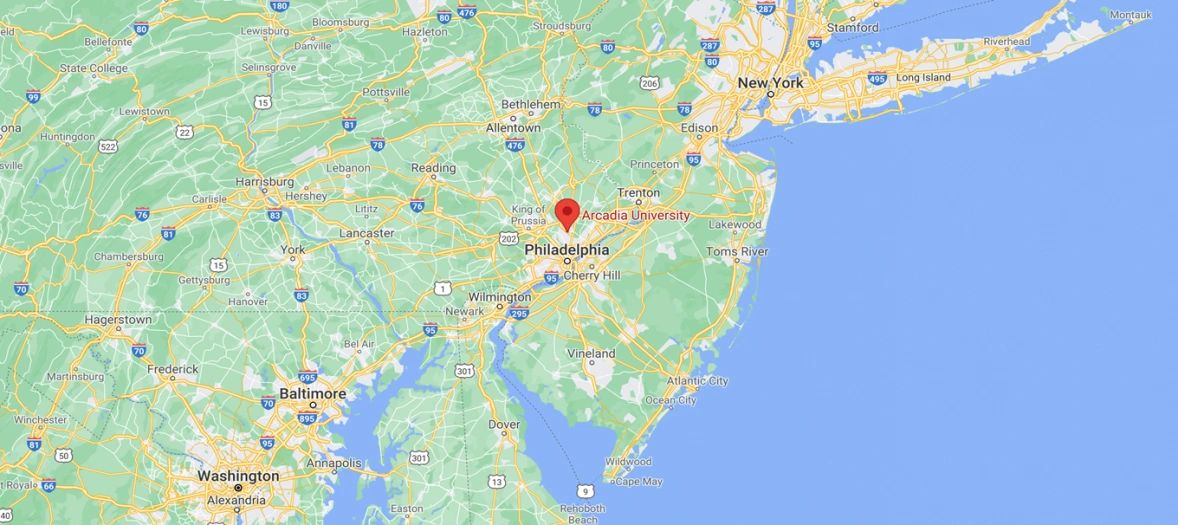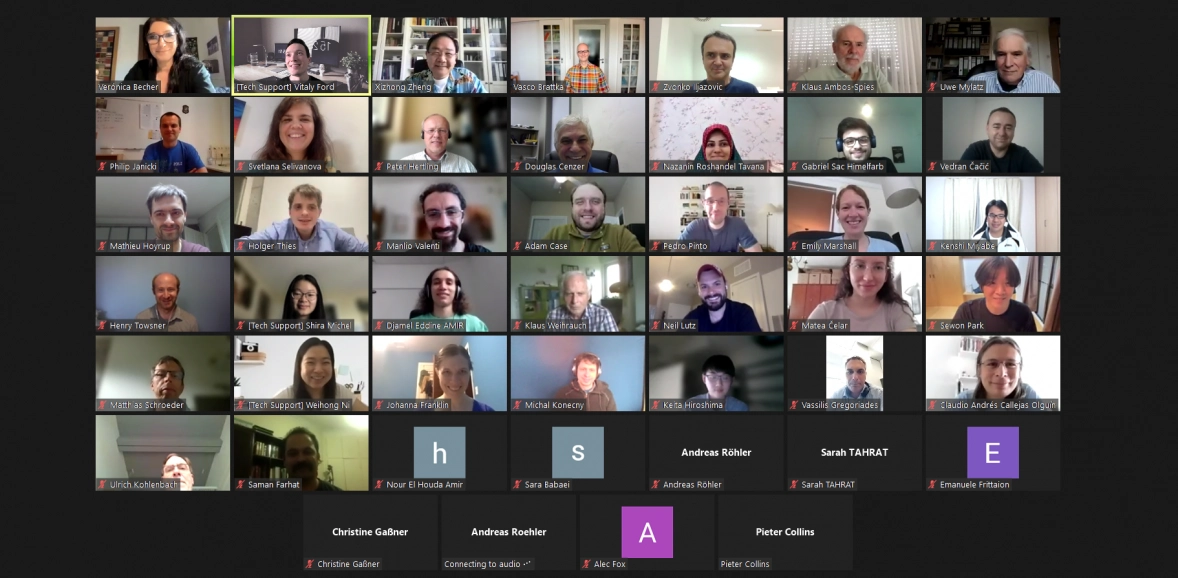Nineteenth International Conference Hosted Online
The 19th International Conference on Computability and Complexity in Analysis (CCA2022) was held fully-online at Arcadia University on May 23 – 26, 2022.

Map of the Philadelphia region
A map screenshot displaying Philadelphia and nearby cities including New York, NY and Washington, DC.
By train from Arcadia University:
- 30 minutes to downtown Philadelphia
- 1 hour to Philadelphia International Airport (PHL)
By train from downtown Philadelphia (on amtrak):
- 1.5 hours to New York, NY
- 2 hours to Washington, DC
By car from Arcadia University:
- 25 minutes to downtown Philadelphia
- 2 hours to New York, NY
- 2.5 hours to Washington, DC
Registration and Agenda
Please fill out this form to receive a Zoom link and register for the online participation. The agenda is available at the bottom of this page.
Contacts
Location: Arcadia University, Glenside, PA, USA
Dates: May 23 – 26, 2022
Organizing Committee: Vitaly Ford, Emily Marshall, Weihong Ni and Xizhong Zheng [Chair of the Organizing Committee]
Emails: {fordv, marshalle, niw, zhengx} @ arcadia.edu
Contact email: cca2022@arcadia.edu
General CCA webpage: http://cca-net.de/cca2022
Submission
Authors are invited to submit 1-2 pages abstracts in PDF format, including references via the following web page:
Topics
- Computable analysis
- Complexity on real numbers
- Constructive analysis
- Domain theory and analysis
- Effective descriptive set theory
- Theory of representations
- Computable numbers, subsets and functions
- Randomness and computable measure theory
- Models of computability on real numbers
- Realizability theory and analysis
- Reverse analysis
- Weihrauch complexity
- Real number algorithms
- Implementation of exact real number arithmetic
Dates
- Submission deadline: March 21, 2022
- Notification to authors: April 18, 2022
- Final version: May 9, 2022
Invited speakers
- Verónica Becher (Buenos Aires, Argentina)
- Jun Le Goh (Madison, USA)
- Isaac Goldbring (Irvine, USA)
- Daniel Graça (Faro, Portugal)
- Vassils Gregoriades (Athens, Greece)
- Elvira Mayordomo (Zaragoza, Spain)
- Alexander Melnikov (Wellington, New Zealand)
- Henry Towsner (Philadelphia, USA)
Steering Committee
- Vasco Brattka, chair (Munich, Germany and Cape Town, South Africa)
- Peter Hertling (Munich, Germany)
- Akitoshi Kawamura (Fukuoka, Japan)
- Klaus Weihrauch (Hagen, Germany)
- Ning Zhong (Cincinnati, USA)
- Martin Ziegler (Daejeon, Republic of Korea)
Scientific Program Committee
- Vasco Brattka, chair (Munich, Germany)
- Douglas Cenzer (Gainesville, USA)
- Cameron Freer (Boston, USA)
- Mathieu Hoyrup (Nancy, France)
- Zvonko Iljazović (Zagreb, Croatia)
- Takayuki Kihara (Nagoya, Japan)
- Ulrich Kohlenbach (Darmstadt, Germany)
- Neil Lutz (Philadelphia, USA)
- Timothy McNicholl (Ames, USA)
- Svetlana Selivanova (Daejeon, Republic of Korea)

Group photo of the conference CCA 2022 participants
This screenshot shows only a few of the more than 100 registered participants of CCA 2022.
Recordings
- Vittorio Cipriani (Italy) and Arno Pauly (UK) – Embedability of graphs and Weihrauch degrees
- Michal Konecny (UK), Sewon Park (JP) and Holger Thies (JP) – Nondeterministic limits and certified exact real computation
- Henry Towsner (Philadelphia, USA) – Borel Combinatorics Goes Wrong in HYP
- Sam Sanders (Ger) and Dag Normann (Nor) – On the computational properties of basic mathematical notions
- Gabriel Sac Himelfarb (Arg) – A construction of lambda-Poisson generic sequence
- Alexander Melnikov (Wellington, New Zealand) – Computable topology and topological groups
- Elvira Mayordomo (Zaragoza, Spain) – Exploring the point-to-set principles for algorithmic dimensions
- Djamel Eddine Amir and Mathieu Hoyrup (FR) – Descriptive complexity of topological invariants
- Vassils Gregoriades (Athens, Greece) – Fixed points of positive formulae and of monotone functions
- Isaac Goldbring (Irvine, USA) – Oracle computability of conditional expectations onto subfactors
- Cameron Fraize, Douglas Cenzer, and Christopher P. Porter (USA) – Extraction Rate of Random Functionals
- Jun Le Goh (Madison, USA) – Redundancy of information: lowering effective dimension
- Arno Pauly and Giovanni Solda (UK) – First-order part and sequential discontinuity
Note: Events below are shown in the America/New_York timezone

